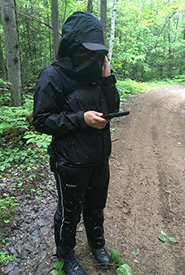Backpack Essentials: Beat the bite

Backpack Essentials (Image by NCC)
Summer is my favourite season. It’s the best time of year to be outside enjoying the sunshine. For mosquitoes, it is also a good time for them to feed on unsuspecting humans. In Canada, these blood-sucking creatures rarely carry deadly diseases, but they are still a nuisance to many of us who are trying to enjoy the beautiful weather.
In my last Backpack Essentials blog post, we explored the mysterious wetland ecosystems of the Nature Conservancy of Canada’s (NCC) Quebec properties. For this post, I spoke to Arigna Luangphachaleun, an NCC stewardship intern working in Quebec’s Laurentian and Green Belt regions, for tips on dealing with mosquitoes.
Arigna is very funny, and she introduced me to wetland ecosystems with an anecdote from the field. Arigna and her supervisor parked their car near a bog. But before they could even get out of the car, they could hear the mosquitoes buzzing outside. She remembered that she had packed a ridiculous-looking mosquito head net in her bag. But wearing it saved her from being swollen with bites that day. Since that experience, Arigna cannot go into the field without her handy mosquito head net.
Related blog posts
Indeed, standing water that is devoid of fish, including some wetlands, puddles and vernal ponds, are mosquito breeding grounds. In the summer, female mosquitoes feed on the blood of animals to get enough protein to grow their egg clutches, which they will then lay just beneath the water’s surface.

Arigna cannot go into the field without her handy mosquito head net. (Photo by NCC)
While some mosquito species breed in wetlands, wetlands also support many species that feed on mosquito larvae and adults. There’s even some evidence that healthy wetlands produce fewer mosquitos than wetlands that have been degraded or drained and have lost their mosquito predators.
“Even if you are not in a wetland area,” said Arigna. “You should always keep a travel-size insect repellent with you.” Arigna prefers smaller-sized insect repellent containers — concentrated with 30 per cent DEET — as they fit nicely in the pocket of her hiking pants. This way, she doesn’t have to stop in the middle of work to rifle through her backpack and look for bug spray.
To protect yourself against mosquitoes, wear light-coloured clothing, long sleeves and remember that mosquitoes are most active at dusk and dawn.
Working outdoors as conservation interns is all about hard work and saving time. Just like our NCC interns, be prepared and don’t let the mosquitoes hold you back as you explore the outdoors.


